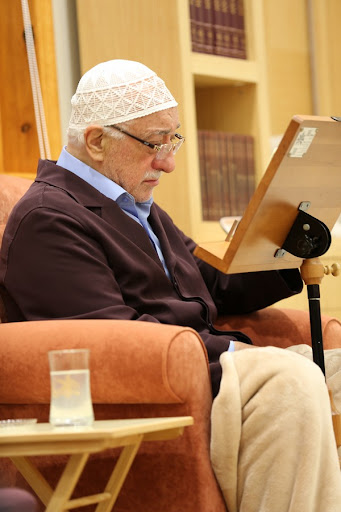I attended the lectures of Mr.Fethullah Gulen Hodjaeffendi as a listener on a Thursday morning several weeks ago. The subject was Tafsir, exegesis of the Quran, and I noted down the following two sentences:
“Should Allah (SWT) wish, He may create a living by the hands of a human being. Although it does not seem to be possible at this moment, it might be possible in the future for a living being to come alive and a dead person to answer questions.”
When I asked Hodjaeffendi, “Is this a sign of the level of medicine will reach in the future?”, his answer was clear:
“Bediuzzaman Said Nursi points out the same (Twentieth Word). It might be possible to bring a dead person back to life. It may be possible to bring a person whose heart has stopped back to life. Prophet Uzair was resuscitated one hundred years after his death. Allah the Almighty resurrects the dead through the hands of the Messiah and makes the people who were born blind see clearly.”
All of the above are the statements of Hodjaefendi related to the interpretation of the fourth verse of Surah Al-Baqarah. For extensive knowledge, please check his work “Bir İ’câz Hecelemesi” where he interpreted this verse and also discussed “life”. (Surah Al-Ma’idah verse 110 about Jesus. The verse explains Jesus resurrecting the dead, curing the blind, and blowing a bird from mud to bring it to life.)
In Hodjaefendi’s course, he is lecturing the graduates of the Faculty of Theology since 1985 about his classical work that focuses on tafsir, hadith, fiqh, and Islamic philosophy. There are around 30 students in his lecture termly.
We could also call his other conversations as lectures. Because you will be able to be a listener in Hodjaeffendi’s first circle of lecture and also join his other conversations. In this regard, we call this place “the camp”. A camp that allows the human spirit to regenerate as a result of lectures, worship, and contemplation…
In this article, I will share with you the notes I have taken about both current affairs and other matters during our two-day stay in the camp.
This is a great measure in terms of the relationship of the members of the Gulen Movement with the members of other religions across the world. Hodjaeffendi makes the following remark about the interpretation of the verses of Surah Al-Baqarah that focuses on the people of the book:
“It is recommended to be respectful to the booklets and books that were revealed before the Qur’an in terms of the nature of their revelation. The Torah and the Bible were true books in their commencement. During a time when your books were not accepted nor approved, the Qur’an arrived as a confirmative witness to you… Today, it is very important about the relationship towards the Christians and Jews. This conduced towards the birth of liberal systems and humanistic ideas.”
For the historical truths of this matter mentioned by Hodjaefendi, you are more than welcome to check “The Crucible of Islam” published in 2017 by Glen W. Bowersock, a history professor at Harvard University. When the Persians entered Jerusalem in 614, they destroyed the city and massacred the Christians, and seized the Great Cross. At a later stage, the Romans defeated the Persians, and Jerusalem was passed into other hands again.
Prof. Bowersock explains the following after the arrival of Islam:
“Churches, synagogues, and pagan temples continued their existence in territories conquered by Muslims. They did not touch the mosaics, interior structures, and architecture of the churches. As a matter of fact, brand new churches were built, and the existing churches were repaired and renovated in regions such as Jordan and Arabah between 635-640. The Muslim conquests were not destructive in any sense, and the societies in the conquered regions maintained their culture and beliefs. Muslims arrived in Jerusalem in 638 as a result of a diplomatic agreement and without any bloodshed. Likewise, they advanced substantially without conflicts in Syria, Palestine, and Egypt. At a later stage, the churches carried on with their activities and to be treated as holy places during the Abbasid period.”
Let’s carry on with the notes from the lecture. Mentioning the troubles faced by the members of the Movement today, Hodjaeffendi said, “They launched an all-in attack on us. Our part here is to be patient… The patient will be victorious… Our Prophet (PBUH) says not to be troubled even when there are two people, since Allah is with us…”
The following verse of Quran also mentions the same thing, doesn’t it? “So, you who believe, have endurance in suffering, be patient and persevere, strengthen each other and be firm, and be pious and fear God that you may find success.” (Surah Al Imran, 200)
Hodjaeffendi stated the following after he opened his hands and gestured a scissor when one of the guests stated that the Gulen Movement has been subjected to oppression in the past, but the services have even developed more each time:
“I hope the subsequent initiatives will be more serious. They do not give us the opportunity to serve in our own country, but it is not clear what these incidents (in terms of destiny) will bring. Because there are certain developments directly proportionate to the suffering and difficulties endured. Every matter has a tomorrow. Living without a tomorrow means living without a purpose. Everything has a tomorrow and there is even a longer tomorrow than tomorrow which is the eternal life. I have never lived without hope even during the most critical times. I do not remember being bored during my most tormenting prison times. However, I have never suffered from any torments as a result of them. How well it was doing and where it managed to reach. Turkey’s future depended on it. But we cannot know the wisdom of Allah (SWT). Dazzling destiny plans… Maybe somebody cannot bear it but there is also an exemplary handling around the world. It is always like this despite their defaming. They are carrying out doctorate studies (about the Gulen Movement) in many places. Very important references…”
When I stated, “You had told two academic guests who arrived from Australia a couple of years ago that eventually the conscience of humanity will prevail over the oppression the Gulen Movement suffered”, he provided the following answer:
“I completely have faith in that. However, it is not in our hands to designate the time…”
Professor Jon Pahl, as a foreign observer, states the following in his book “Fethullah Gulen, A Life of Service”: “The Gulen Movement proceeded on its way, getting even stronger after each period of oppression.” We hope this will be the case again.
I asked the following question while Hodjaeffendi was talking about on this matter:
“A matter you dwell on quite frequently is the Islamic thought reaching the peak during the ninth and tenth centuries and then its decline… Do the teaching staff of the Gulen Movement have a responsibility about a new renaissance point like the first Islam renaissance?”
His answer:
We are expecting this… They saw the peak in every field. They even tried to fly. Then they calculated the circumference of the earth. It is the same for both religious sciences and descriptive sciences. They blended everything. That does not mean it will not happen again. We must exert every effort to do it. My heart desires that the theology students to study astronomy, astrology, physics, and chemistry after theology and blend them altogether. That’s what the people in the past did.”
Is it possible to have a clearer message than this? I personally believe that the scientists explained by Hodjaeffendi here will be raised and receive many Nobel prices.
Another matter that actually shows that it is very crucial to aim for peaks not only the science but in every other field… Hodjaeffendi stated the following when an artist, who received two international awards for a short film that was shot recently, was presented to him:
“It is necessary to take everything to the peak as long as they are legitimate.”
One of the matters Hodjaeffendi emphasizes on during the hadith lectures is how the people who narrated hadiths lived a meticulous life and their immense curiosity towards learning. He says:
“The root is so strong… They were trusted with it, and they carried it thus far. They were learning back then with a tremendous curiosity. Our generation still is not capable of knowing many things. It is important to leave imitation (superficial perception of Islam) aside. Our Prophet (PBUH) wants everything to be learned straightforward and attributed to human nature. We should build our lives just like a Naʽat (poetry in praise of the Islamic Prophet) lace. Always praise, always appreciation, always mashallah. He is the grace of Allah Almighty (SWT). He is the special grace of Allah (SWT) to us, the exclusive grace. I am older than eighty now. Our Prophet (PBUH) did not live that long, and I am ashamed. We have neither earthly nor ethereal expectations. Aside from Allah’s (SWT) mercy.”
This is how Hodjaeffendi expresses with sadness the distance of the Muslims from the main subjects of Islam today. Hodjaeffendi states the following while reading “Isharat Al Icaz” 116-117 of Bediuzzaman Said Nursi:
“The things mentioned here are explained in detail in The Treatise on Nature. All roads to objection are closed and all roads to Allah (SWT) are opened wide.”
Hodjaeffendi asked how many pages we passed after he read the 159th verse of Surah Al-Baqarah, and after hearing the answer was 13, he stated “In sha’Allah we gradually speed up.”
One of the most important characteristics of Hodjaeffendi is that he is constantly interested in the people around him.
He turned to a young guest who was visiting and asked how much weight he had lost. This youngster apparently lost a lot of weight. Then Hodjaeffendi asked him about his mother and stated, “Weight is a burden that people carry on their shoulders.” He stated that treatments such as sleeve gastrectomy should be considered if it is not a problem.
Referring to the coronavirus, he stated, “The virus seems to be through with us…” and turned to a guest who had knowledge on the subject in the hall and wanted to get information. Hodjaeffendi stated, “Vaccines must be shot, I always say that.”
Hodjaeffendi always acts according to the data provided by modern medicine. He was vaccinated very early with the advice of the doctors after the corona vaccine came out.
At this point I stated, “There are a lot of people opposing the vaccine. They are opposing by stating that the vaccine harms the human body.”
Hodjaeffendi asked the following:
“Do they mention any evidence about how the vaccine harms the humans, is there any evidence about this?”
He stated the following after I said that some people died after getting vaccinated:
“They might have different illnesses; some different medication might be used simultaneously. It is important to ground on medical and certain data instead of possibilities.”
Another point Hodjaeffendi emphasized on due to this virus was the potential danger imposed by the people who are not vaccinated towards the other people and themselves.
There were also ladies present in the communion held outside on Friday after the Friday prayer. When the treats arrived, Hodjaeffendi asked them to be given to the ladies first. He turned to the ladies’ side after he got up at the end of the communion and said, “Excuse me.” to them. I guess this instantiation points out to something very important about the status of the women in the eyes of Hodjaeffendi. Later, I have read the translations of the hadith that was read in Arabic in the hadith classes. It was about the prayer lines of men, women, and children inside the mosques. This is another important point that suggests the presence of women in all areas of life.
These days, works such as “Tabari Tafsiri”, “Isarat-ul Ijaz”, “Bir İ’caz Hecelemesi” in tafsir, and “Abu Dawud corpus” in hadith, and “Emerald Hills of the Heart” in Islamic philosophy are being read and discussed in the classes.
I have realized something during the two days we have spent with Hodjaeffendi. You become a part of the class and you feel the regeneracy in your soul closely when you listen to the lectures and conversations with upmost concentration.
And the idea of carrying on with the movement and the efforts once again surrounds yourself.
An individual asked Hodjaeffendi during his stay in a mosque in Edirne, “Why are you sleeping? You will be constantly sleeping in the grave.” He recounted this memory and talked about his enthusiasm about carrying on the lecture despite his current illness.
What a wonderful piece of advice that makes people think it is a great day to be awake.
By: Faruk mercan
Source: Poli Turco



